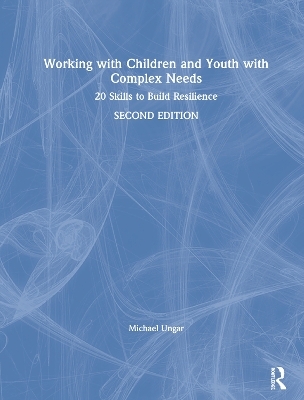
Working with Children and Youth with Complex Needs
Routledge (Verlag)
978-0-367-35533-3 (ISBN)
This new edition of Working with Children and Youth with Complex Needs provides detailed descriptions of techniques, ample case studies, fascinating and easy to understand explanations of research, and rich stories of how social workers, psychologists, counselors, child and youth care workers, and other mental health professionals can help young people become more resilient.
Fully updated and including new discussions of trauma, adverse childhood experiences (ACEs), resilience, genetic susceptibility to stress, the impact of migration and natural disasters on families, and much more, Dr. Ungar shows why we need to work just as hard changing the environments that surround children as we do changing children themselves. Building on lessons learned from clinical, community and residential settings, Dr. Ungar discusses a shortlist of 20 essential skills that can enhance the effectiveness of frontline mental health services without relying on expensive, resource heavy programs. Along with descriptions of the skills necessary to talk with clients about the factors that put their mental health at risk, Working with Children and Youth with Complex Needs presents systemic practices clinicians can use in their everyday work to help their clients transform their worlds and improve their access to the resources they need to succeed.
Chapters present a variety of practical strategies that clinicians can use to enhance and sustain the therapeutic value of their work, including engaging with children's extended family; addressing issues of community violence, racism and homophobia; and helping parents and teachers understand (and change) children's maladaptive coping strategies. A series of videos accompanies the text to help readers see the skills that are discussed being applied to real-life situations mental health professionals and their community allies encounter.
Michael Ungar, PhD, RMFT, RSW, is a professor of social work and the Canada Research Chair in Child, Family, and Community Resilience at Dalhousie University. He is among the best-known writers and researchers on the topic of resilience in the world and the author of 16 books that have been translated into five languages; numerous manuals for parents, educators, and employers; as well as more than 200 scientific papers. His blog "Nurturing Resilience" can be found on Psychology Today’s website. Dr. Ungar is also the founder and director of the Resilience Research Centre, former chair of the Nova Scotia Mental Health and Addictions Strategy, executive board member of the American Family Therapy Academy, and a family therapist who works with mental health services for individuals and families at risk.
Acknowledgements 1. A Social Ecological Approach to Clinical Work With Children, Youth, and Families 2. Why a Social Ecological Practice Works 3. Principles and Skills for a Social Ecological Practice 4. The First Set of Skills: Help Clients Navigate 5. The Second Set of Skills: Help Clients Negotiate 6. The Five Phases of Counseling 7. Perils and Pitfalls of Being a Counselor 8. Getting Our Organizations to Adopt a Social Ecological Approach to Clinical Practice, Case Management, and Advocacy 9. The Counselor as Advocate References Index
| Erscheinungsdatum | 07.07.2020 |
|---|---|
| Zusatzinfo | 1 Tables, black and white; 7 Line drawings, black and white; 1 Halftones, black and white; 8 Illustrations, black and white |
| Verlagsort | London |
| Sprache | englisch |
| Maße | 210 x 280 mm |
| Gewicht | 453 g |
| Themenwelt | Medizin / Pharmazie ► Medizinische Fachgebiete ► Psychiatrie / Psychotherapie |
| Sozialwissenschaften ► Pädagogik ► Sozialpädagogik | |
| Sozialwissenschaften ► Soziologie | |
| ISBN-10 | 0-367-35533-7 / 0367355337 |
| ISBN-13 | 978-0-367-35533-3 / 9780367355333 |
| Zustand | Neuware |
| Haben Sie eine Frage zum Produkt? |
aus dem Bereich


